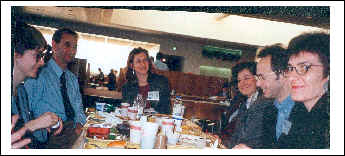| THE 'PREHISTORY' OF Social
Watch
7- NGO Alliances
7.1 - People´s Alliance and
El Taller
The People's Alliance had not secured
a lot of funding for its work by the first PrepCom. Novib
had agreed a symbolic contribution, and had also agreed to
work with, but not as part, of the People's Alliance.31 The
most extensive network engaged in the People's Alliance was
El Taller, an NGO based in Tunis. Novib originally established
el Taller and at that time was still heavily dependent upon
Novib funding. The involvement of El Taller in the Social
Summit gave Novib an opportunity to bring together partners
involved in both the board of El Taller and the reference
group.32 As a result there was very much overlap, particularly
in the beginning, between the reference group and the EL Taller
group - and hence with the People's Alliance.
7.2 - Linking into
the APC network
In November 1993, El Taller held its
General Assembly, which coincided with a regional consultation
on the Social Summit organised with the People's Alliance.
At this meeting the problem was identified that Southern NGOs
lacked information with regards to what was happening in the
preparations of the Social Summit. A proposal was drafted
to develop a project for an 'information officer' in New York
which would channel information on the preparations to the
Southern (and Northern) NGOs. Several NGOs, all member of
the board of El Taller, were identified as focal points for
further disbursement of information in the region. The proposal
was submitted to Novib, and after approval the position was
put out as a tender to the NGO community. November 29th of
1993 Novib offered the job to the candidate from Instituto
Tercer Mundo after consideration of a number of Southern candidates.33
The offer, which the information officer accepted, was to:
"assume the post of information
broker in New York (..) and disseminate (..) throughout the
network of NGOs participating in the events that will lead
to Copenhagen, - regional consultations - PrepComs - other
relevant meetings - updating agenda's of meetings and monitoring
of the Preparation Commission in the UN."34
The appointment of the candidate of
ITeM, which was a member of electronic network APC that promoted
electronic information dissemination for Non Governmental
Organisations, created an enormous potential for the mobilisation
of participation at local and national level in the Summit.
7.3 - WEDO
A few other NGOs were instrumental
in organising alliances of NGOs during the first PrepCom.
The Women's' Environment and Development Organisation (WEDO),
whose chair was the famous activist and politician Bella Abzug,
well connected to Washington. WEDO had a vast experience in
engaging in the UN conferences and worked predominantly with
women's' organisations. WEDO's work in the conferences had
the objective to engage as many NGOs as possible in a productive
process of engagement with the official process. WEDO provided
a space for meeting and exchange in the 'Women's Caucus' that
they established. It provided important information on the
developments in the official process as well as exchanges
with representatives of government. The tools produced by
WEDO and the Women's Caucus included precise language for
inclusion in the official texts distributed to the official
delegates.

The Women's Caucus also had a direct
link to Somavía, whose wife participated in the Caucus.
The Caucus included organisations that participated in the
Summit with direct support from WEDO, but it was open to anybody
interested in contributing to the issues on which the Caucus
was working. WEDO's experience in following UN conferences
provided an excellent space for obtaining relevant information
and opportunities to learn strategies of engagement with the
official process that had a real possibility of influencing
the process.35 During the first PrepCom the Novib reference
group began to attend the morning Women's Caucus in its entirety.
The participation of more Southern and Northern groups related
to the 'reference group' gave WEDO an even greater political
weight.36 The very close co-operation and trust between Abzug
and Novib's van den Berg - also expressed in a 'symbolic'
financial contribution from Novib to WEDO, was an important
aspect of the NGO alliances established during the Social
Summit process.37
7.4 - Eurostep
At the Eurostep Steering Committee
meeting of the 24th March 1993 it was agreed that a list of
UN meetings should be produced and steps should be made to
co-ordinate efforts of the member organisations in these meetings.38
Novib produced this list in April. In June 1993 Novib and
the Danish NGO MS raised the question of the participation
in the Social Summit in the General Assembly, consisting of
its 23 Directors of European Development Organisations. At
the same time Mani Tese, one of the member organisations,
was organising a Convention to take place in Florence in November
1993 on "People's participation", in part as an
input in the Social Summit.39 On 9 December 1993 Somavía
attended an informal meeting with the General Assembly of
Eurostep.40 A working group of Members active in the Social
Summit was established.41 Together with Novib the secretariat
of Eurostep prepared a Eurostep statement for the first PrepCom
and organised regular meetings for the Members present in
the PrepCom.

Eurostep emphasised that a focus should
be developed of advocacy towards the EU and EU Member States.
The secretariat attended all the PrepComs in order to co-ordinate
the work of the several Member organisations involved in the
process.42 In doing so it provided a specific focus on the
negotiations from a regional reality. In the case of the EU
this was particularly complex because positions between EU
Member States were co-ordinated and presented by the EU Presidency.
Eurostep ensured that advocacy and national and EU level would
not be contradictory. It also gave continuity and consistency
in relations with the different actors, including the individual
Member States, the European Council, the European Commission,
the European Parliament and the Presidency.
|